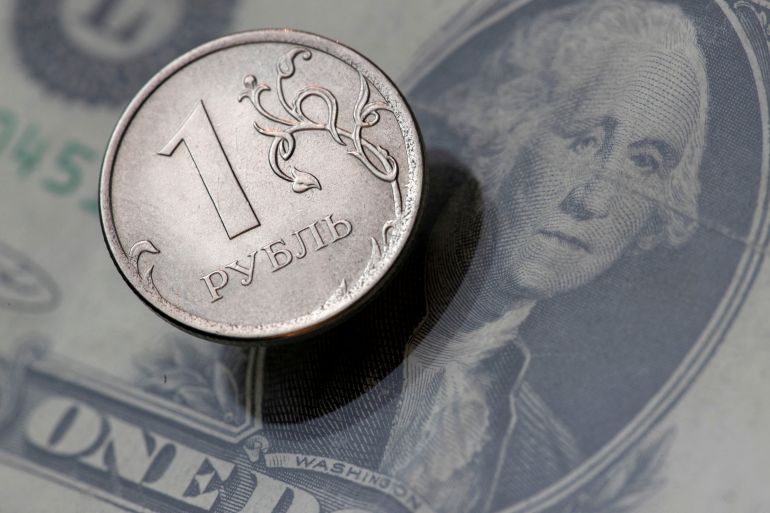Russian rouble plunges to record low amid outrage over Ukraine
Investors flock to safe haven currencies including the US dollar and yen amid growing international isolation of Moscow.

The Russian rouble plummeted to a record low against the dollar on Monday amid an accelerating Western-led campaign to punish and isolate Moscow over its invasion of Ukraine.
Investors flocked to safe-haven currencies, including the US dollar and yen, after Russian President Vladimir Putin put nuclear-armed forces on high alert on Sunday, the fourth day of the biggest assault on a European state since World War Two.
Keep reading
list of 4 itemsMore than 2,000 arrested at anti-war protests in Russia
Key questions after Putin’s nuclear announcement
Latest Ukraine news: Guterres says dialogue must remain open
The United States, European Union, United Kingdom, Japan, Canada and Australia have announced a raft of sanctions to punish Russia in recent days amid growing international outrage over Russian President Vladimir Putin’s military offensive against Kyiv.
The measures include blocking some banks from the SWIFT international payments system, preventing Russia’s central bank from using its foreign reserves, banning broadcasts of Russian state media, and restricting Russian flights from European airspace.
The rouble plunged as low as 119 per dollar, and was last down nearly 29 percent at 118.
“Once business opens in Vladivostok no one in the world will want to buy roubles, even the Central Bank of Russia,” Tim Harcourt, chief economist at the Institute for Public Policy and Governance at the University of Technology Sydney, told Al Jazeera.
Talks between Russia and Ukraine
The euro also sank, dipping 0.76 percent to $1.11855, after earlier falling as much as 1.34 percent. The single currency lost 0.73 percent to 129.265 yen, and was 0.60 percent lower at 1.03665 Swiss franc.
The rouble’s rout came as satellite images appeared to show a large deployment of Russian ground forces moving towards the Ukrainian capital Kyiv, and ahead of talks between Ukraine and Russia on Monday morning near the Belarusian border.
“The escalating crisis in Ukraine will force markets to price in a substantially higher geopolitical risk premium, [and] that is going to leave safe havens like the USD bid,” Westpac strategists wrote in a client note.
“The Ukrainian situation is volatile, and so too is market sentiment, although a risk-averse backdrop near term appears the most prudent assumption,” meaning more downside for Australian and New Zealand dollars, they said.
The Aussie slid 0.75 percent to $0.7183, while New Zealand’s kiwi sank 0.79 percent to $0.66915.